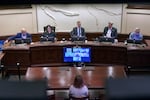Portland is one step closer to a complete overhaul of its governance system.
On Wednesday, the Portland City Council unanimously appointed 13 people to a committee responsible for proposing how to divide Portland into four geographic districts to meet the needs of the city’s new form of government.

Diana Shiplet, bottom, presents to the Portland City Council, Jan. 25, 2023. The council confirmed the appointment of thirteen people to the Independent District Commission, a new committee that will be responsible for drawing new district maps for Portland's new form of government.
Kristyna Wentz-Graff / OPB
“I want to say how impressive this group is,” said City Commissioner Carmen Rubio. “It’s really important work at an important time for the city, they will quite literally be making history as they begin the process to create these districts.”
This committee’s work is part of a larger process to transition Portland to a new form of government by 2025.
For the past 110 years, Portland has operated under a commission form of government, in which commissioners are appointed through citywide elections and are primarily tasked with managing city bureaus. In November 2022, Portlanders voted to adopt a new governance structure, which will divide the city into four districts, with three commissioners representing each district. This model will allow elected officials to focus more on developing legislation that reflects the needs of constituents in their district — and will pass off all bureau oversight responsibilities to an unelected professional city administrator. The plan increases the size of the Portland City Council from five to 12 elected officials. The mayor is currently a member of the council, but will strictly serve as a city executive under the new structure.
The switch to district representation is meant to improve diversity on the city council and reflect the needs of constituents across the entire city. Due to the high costs of funding a citywide election, Portland’s commissioners have tended to come from the city’s wealthier, whiter neighborhoods — and they’ve often been accused of prioritizing their neighbors’ needs over others. A representative form of government requires commissioners to live in at least four different areas of the city to better reflect all Portlanders.

Portland City Commissioner Carmen Rubio, left, said she was impressed with the appointed committee members.
Kristyna Wentz-Graff / OPB
Critics of this plan worry that appointing three commissioners per district will make it more difficult to hold individual elected officials accountable for district-related problems.
The committee appointed Wednesday is solely responsible for drawing the geographic boundaries of the four districts. Per the city charter, these districts must be contiguous, of equal population, factor in existing geographic boundaries, and must not be drawn in a way that favors political parties or dilutes the voting strength of any specific demographic group. The district map must also be consistent with state and federal laws. The committee will work closely with the city attorney’s office to meet those guidelines.
Members are required to seek public input to inform their final districting plan, which needs to be finalized by September 1, 2023. The maps will ultimately be voted on by the district committee. If at least nine of the 13 members approve the final district map, it will go into effect. If fewer than nine approve the map, it will go to a City Council vote.
Mayor Ted Wheeler was responsible for selecting the 13 committee members out of nearly 300 applicants to serve.
“It made for a difficult selection process,” Wheeler said Wednesday.
The group is made up of Portlanders with a background in community advocacy work, political science, and project management. That includes Democratic political consultant Kari Chisholm, labor organizer Lamar Wise, neighborhood activist Arlene Kimura, and Native American Youth and Family Center (NAYA) CEO Paul Lumley.
Each member will be paid $500 for their work over the next eight months.
The work to prepare the city for a government transition follows two years of effort by a 20-person volunteer city commission to propose a series of amendments to the city charter for voters to consider. Although city staff say the charter commission’s work involved a level of public engagement not seen before in city history, the process attracted criticism from some Portlanders who felt like their perspectives weren’t taken into consideration.

Portland City Council Commissioners Rene Gonzalez and Dan Ryan listen to testimony at Portland City Hall.
Kristyna Wentz-Graff / OPB
City Commissioner Dan Ryan mentioned this concern in relation to the new district mapping commission at Wednesday’s meeting.
“What I heard consistently was that, once the decisions were made [by the charter commission], it felt really rushed,” Ryan said.
The charter commission first proposed new amendments in April 2022 and held four community meetings to gather public input before referring the proposals to the November 2022 ballot.
Ryan urged city staff to allow for more community engagement after the new district commission draws district boundaries to avoid the previous issues.
“With this commission having a limited time frame, that does pose some challenges,” said Diana Shiplet, an employee with the Office Management and Finance overseeing the government transition plan. “We’re hoping that as part of this, we’re going to open the engagement broader, earlier.”

Diana Shiplet presents to the Portland City Council, Jan. 25, 2023. The council confirmed the appointment of thirteen people to the Independent District Commission, a new committee that will be responsible for drawing new district maps for Portland's new form of government.
Kristyna Wentz-Graff / OPB
The district committee is the first of three community groups convened to help implement the looming transition to a new city structure. Over the next several months, Portland City Council will appoint members to serve on a commission responsible for establishing the salaries for future elected officials, and an advisory committee tasked with overseeing the broader transition to a new form of government.
City elections staff are also expected to begin work this month to address one additional promise of the November ballot measure: A citywide transition to ranked-choice voting, an election system that allows voters to rank candidates in order of preference. Portland is scheduled to hold its first ranked-choice election in November 2024; all 12 new council seats — as well as the mayor and city auditor — will be up for election.
